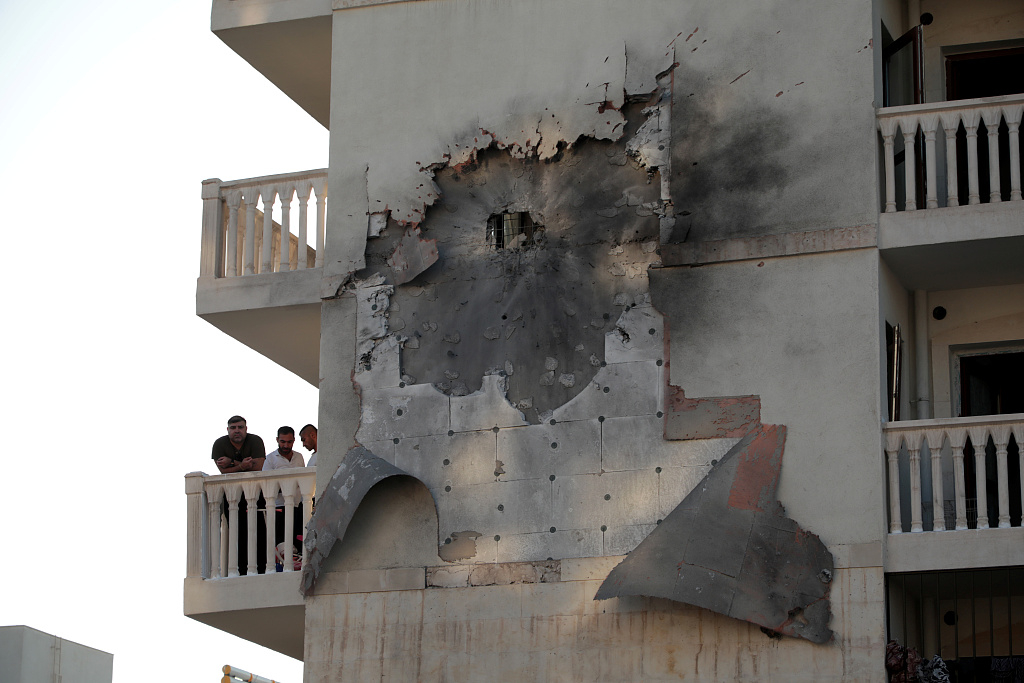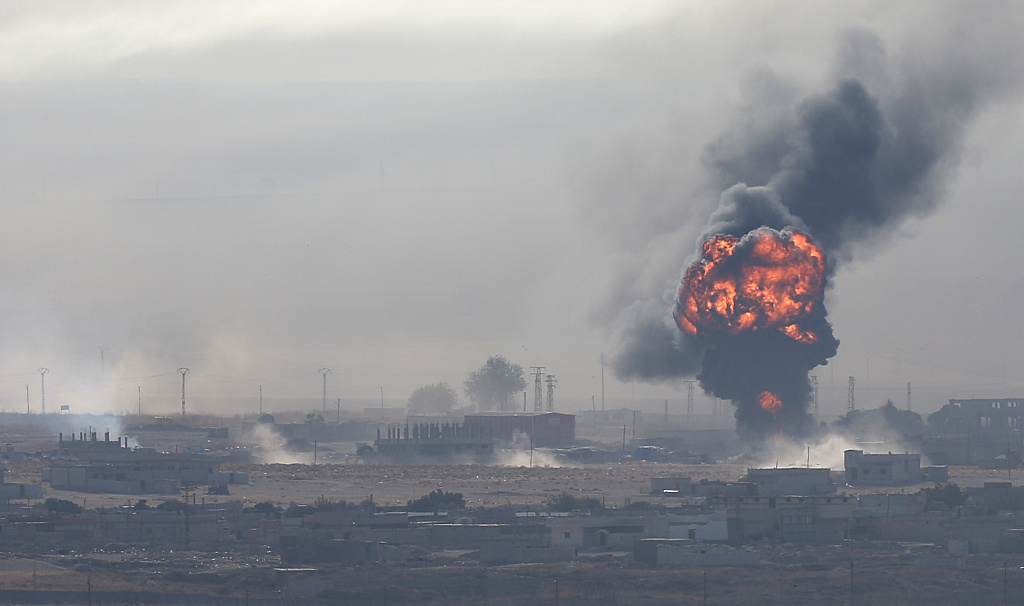
Turkish military vehicles carrying tanks head to the Syrian border as farmers work in a cotton field in Akcakale, Turkey,October 12, 2019. /VCG Photo
Turkish military vehicles carrying tanks head to the Syrian border as farmers work in a cotton field in Akcakale, Turkey,October 12, 2019. /VCG Photo
Editor's Note: Dr. Wang Jin is a research fellow of Charhar Institute in China and a research fellow from Syria Research Center of Northwest University in China. The article reflects the author's opinions, and not necessarily the views of CGTN.
After U.S. President Donald Trump decided to withdraw U.S. military presence from northern Syria, Turkish military forces and Ankara-backed Syrian rebel groups started to launch offensive against the Kurdish Democratic Union Party (PYD) forces in northern Syria. Turkey's latest offensive might further worsen the tension in northern Syria and bring new risks and challenges to Syrian peace process.
Turkey's concerns
After Syrian civil war erupted in 2011, Turkey mainly have two concerns. The first one is that it fears that the PYD and its military group, Syrian Kurdish People Protection Units (YPG) and Syrian Democratic Forces (SDF) will establish a powerful base at northern Syria.
From 2014 to 2015, the PYD became the major forces in northern Syria to resist the expansion of ISIS and started to retake large territories from ISIS. Therefore the PYD has been perceived by international society as an important ally to counter terrorism in Syria, and the U.S. and many European countries would also provide PYD with financial and weaponry support.
However, from Ankara's perspective, the PYD is the major branch of the "terrorist group", Kurdish Workers' Party (PKK), in southern Turkey seeking establish an independent Kurdish country. Ankara therefore defined the PYD as "terrorist group" on different occasions and promised to eliminate the presence of PYD in northern Syria.

People look out from an apartment building damaged by a rocket fired from Syria, in Nusaybin, Turkey, October 10, 2019. /VCG Photo
People look out from an apartment building damaged by a rocket fired from Syria, in Nusaybin, Turkey, October 10, 2019. /VCG Photo
Turkey's second concern is the settlement of more than 3.5 million Syrian refugees, which have been a long-time burden for Turkey. At the beginning of Syria civil war, Ankara believed that the civil war in Syria would end quickly with rebel group's victory as happened in Libya, thus they failed to foresee the large wave of refugees. However, as the Syria civil war prolongs, more and more refugees chose to flee into Turkey, which have added great financial and social pressure to Turkey. Therefore, Turkey hopes to establish a "safe zone" in northern Syria to facilitate their return.
Risks at hand
Turkey has hoped to protect its national security through the military operation, but the military offensive might bring new challenges and risks to both Turkey and Syria. Firstly, it might make Ankara itself become a major target of Kurdish terrorist attack in the future. Ever since the modern Turkey was established in 1920s, the Kurdish issue has been a very sensitive topic for Ankara.
Turkey defines itself as a nation state with single Turkish ethnic group, while many Kurds in Turkey insisted their rights to be an independent nation. The gap between Ankara and Kurds leads to several major conflicts and wars in the following decades.

An explosion is seen over the Syrian town of Ras al-Ain as seen from the Turkish border town of Ceylanpinar, Sanliurfa province, Turkey, October 12, 2019. /VCG Photo
An explosion is seen over the Syrian town of Ras al-Ain as seen from the Turkish border town of Ceylanpinar, Sanliurfa province, Turkey, October 12, 2019. /VCG Photo
Although Erdogan has promised many times that Turkey's offensive in northern Syria targets only "terrorists" rather than Kurds, Ankara's military offensive might further widen the friction between government and Turkey's Kurds and might finally lead to terrorist attacks implemented by some Kurdish nationalists and extremists in the future, as they did decades ago.
In addition, Turkey's military offensive in northern Syria might also bring Syria government and Iran back to battlefield in northern Syria, which will further complicate the current situation. Although Turkey defines itself as a protector of local people in northern Syria, Syria government describes Turkey as "invader" and the Syrian rebel groups supported by Ankara in northern Syria as "terrorists".
Syrian president Bashar Al-Assad and Syria government has promised many times that they would retake all the territories, including northern Syria. So it is highly likely for Syrian government to send forces taking key cities and towns to resist Turkey's expansion, or at least provide assistance and support to PYD to resist Turkey's offensive.
If Syria government chooses to resist Turkey, Iran also needs to make a choice. Ever since 2011 when Syria civil war erupted, Iran has become the most important supporter for Syria government. Iran always hopes the Syria government led by Bashar al-Assad to retake all the territories and maintain the close ties with Tehran. Therefore, if Damascus decides to confront with Turkey's involvements in northern Syria, Iran also needs to decide whether it will offer support to Syria government.
Turkey's military offensive against Syrian Kurdish military groups in northern Syria aims to establish a large "safe zone" to settle more than 3.5 million Syrian refugees and safeguard its national security. However, Turkey's bold offensive and ambitious strategy in northern Syria will anger both Kurds and Syrians. If its offensive action last a long time, it might further worsen the fragile tension in this area.
(If you want to contribute and have specific expertise, please contact us at opinions@cgtn.com)